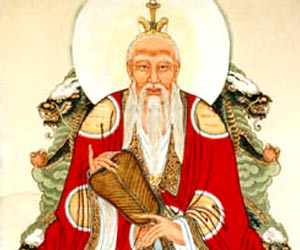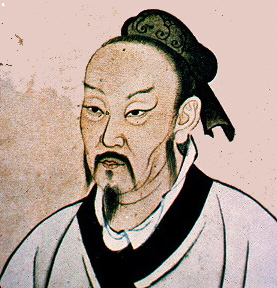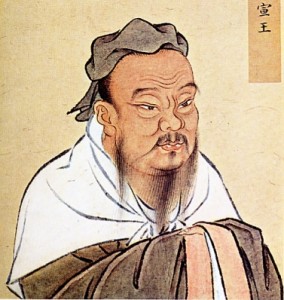Here you will find a brief summary of some of the principal characters within Chinese philosophy, and their lenses through which we have designed our Utopia.
Confucius
Confucius has based his thought in an ancient religious foundation, with which he has outlined the established social values, institutions, and transcendent roles of traditional Chinese society. Taking Zhou dynasty cultural forms into account, Confucius identifies three necessary primary terms: 1) ritual (li 禮), 2) learning (xue 學), and 3) music and the arts. Proper ritual practices are emphasized throughout the entirety of Confucian thought. Most importantly, the Confucian view emphasizes filial piety (xiao 孝), which means to be obedient and respectful of elders. Additionally, Confucius believes that all human relationships should involve a hierarchy of roles and mutual obligations. Should this social hierarchy be properly implemented, the individual should be left with a clear understanding of the proper role they are to perform. From the individual level up, proper behaviors will contribute to the reform and perfection of a well-ordered society.
Laozi

Laozi
Vastly different from Confucius, Laozi focuses much more on the character of the individual. As he thought individual character was greatly influenced by nature, Laozi emphasized “Naturalness” or “spontaneity” (ziran 自然). Another key point of Laozian thought is Wu-wei(無為). Wu-wei means one should focus on doing nothing. This does not mean literally doing nothing, but to follow the flow of natural forces. Following natural forces rather than attempting to shape the flow of events is important, as this does not go against the natural order of things.
Mencius
391-308 BCE – Mencius is thought to have been the student of Zisi(子嗣), Confucius’s grandson. He updated Confucian teachings to address challenges from Mozi and Laozi. Mencius described a flowing energy Qi (气) that should gradually be accumulated to fill the body. As a natural force, 气 needs direction from the heart-mind ( 心). Though directed by the 心, 气 was thought to be energy useful in supporting the heart-mind’s decisions. Mencius believed that rightness was internal, and so doctrines did not trump the heart-mind in value.
“Human nature is good just as water flows downhill. There is no man who is not good; there is no water that does not flow downwards.” 6:A:2
Mencius saw human nature as good (性善), with Confucian morality being natural for the individual. Due to human nature’s dynamic character, it must be shaped in a proper course of development. The essence (情) of humans is meant to grow into Confucian morality. Although human nature contains animalistic desires, “moral sprouts” (芽) are also present. These sprouts may be developed by increasing awareness of their existence and working to cultivate oneself.
Mozi
480-390 BCE – His philosophy is highly anti-aristocratic, and presented a direct challenge to Confucius. Mozi believed Confucius advocated the waste of resources, was partial, encouraged passivity, and mindlessly aped the past. He also criticized the family-based ethical and political system of Confucius because of its strict hierarchy. Impartial caring (兼爱) was important in ensuring that everyone in society was taken care of.
Mozi had poor classical Chinese and Mozian thought is considered the “teachings of the humble man.” He was the leader of an organized utopian movement that took direct social action. Opposed to offensive warfare, Mozi’s followers would militarily defend “victim” states.

Mozi
To Mozi, Virtue (德) is being efficient and honest. The worthy are eminent, wise, capable, hard-working, cautious and respectful. Therefore, worth is measured in the consequences of a person’s actions, not something internal. As a consequentialist, Mozi valued maximizing the wealth, order, and population of the state. Material well-being/profit (利) was the primary goal and reward of good behavior. Proper behavior and social order may be shaped via a strict social hierarchy. Everyone in a society should share the same idea of rightness, as defined by a leader, who had been given his position from Heaven (天).
Mozi believed that human nature was malleable, and that individuals would respond to the treatment they received. Rewards and punishments may be utilized if people did not strive to win the favour of their rulers on their own. The worthy should be honoured with practical material incentives.


 Follow
Follow